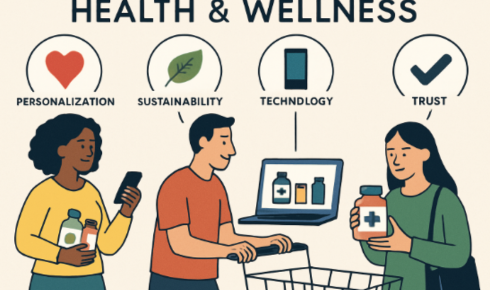Key Takeaways
- Consumers are prioritizing personalized health solutions tailored to their unique needs.
- There’s a growing demand for natural, organic, and sustainable wellness products.
- Technology plays a pivotal role in how consumers discover and purchase health products.
- Trust and transparency have become critical factors influencing buying decisions.
Table of Contents
- Personalized Wellness Solutions
- Demand for Natural and Sustainable Products
- Technology Integration in Wellness Shopping
- Importance of Trust and Transparency
- Influence of Social Media and Influencers
- Rise of Mental Health and Stress Management Products
- Conclusion
Introduction
Consumer behavior in the health and wellness sector has undergone a dramatic shift as more people seek out products that align with their individual needs and values. This change is reflected in the types of items they purchase, the methods they use for making purchases, and the companies they choose to support. Many shoppers now turn to convenient digital platforms for both purchasing and discovering new products, often utilizing savings-focused outlets like https://www.retailmenot.com/view/walgreens.com to find deals on trusted wellness brands. As consumers demand greater personalization and transparency, companies are reevaluating their approach to everything from product formulation to customer engagement.
The modern health and wellness consumer is no longer content with generalized products or opaque business practices. Instead, they prioritize clear labeling, ingredient transparency, technological innovation, and solutions that cater to their unique lifestyles, fundamentally altering the wellness landscape for brands and retailers alike.
Personalized Wellness Solutions
Consumers today expect brands to recognize that every individual has unique and diverse health goals, needs, and lifestyle requirements. This changing expectation is fueling a significant rise in personalized wellness solutions, which encompass a wide range of offerings such as customized vitamin regimens tailored to individual nutritional deficiencies, DNA-based nutrition plans that leverage genetic insights for optimized health strategies, and subscription-based fitness applications that dynamically adapt to a user’s evolving needs and preferences. Personalization in wellness not only involves selecting the right products but also delivering meaningful relevance through tailored experiences, comprehensive education, and continuous, proactive support. Furthermore, consumers are increasingly proactive in their wellness journeys, engaging in self-education through online quizzes, virtual consultations, and detailed product breakdowns to better understand their options and curate personalized paths to well-being. Brands that excel in providing these customized solutions and fostering trust through consistent fulfillment of their individualized promises tend to cultivate strong customer loyalty and long-term engagement.
Demand for Natural and Sustainable Products
A growing portion of the population is scrutinizing ingredient lists, packaging, and sourcing practices with unprecedented attention. Natural, organic, cruelty-free, and sustainably sourced wellness options have become more than just trends; they are now standards that many shoppers expect. According to Brandwatch, 46% of consumers report that sustainability is a key factor influencing their purchasing decisions in the health and wellness sector.
Companies are responding with eco-friendly packaging, transparency about raw materials, and efforts to minimize their environmental impact. Beauty and supplement brands, in particular, are innovating with plant-based alternatives and clean-label certifications, reflecting consumer demand for wellness products that align with their environmental values.Technology Integration in Wellness Shopping
The digital transformation has turned health and wellness shopping into a highly dynamic experience. Consumers now research, compare, and buy products online, empowered by AI-driven recommendation engines, virtual consultations, and interactive apps. Wearable devices collect real-time health data, enabling users to track their progress and tailor their wellness approach. Digital pharmacies, telehealth consultations, and fitness subscriptions have made it easier than ever to access solutions from the comfort of home.
Technology also fosters informed decision-making and convenience. As technology merges with wellness, it nurtures a new ecosystem where data and user engagement directly influence product development, solidifying technology as both a tool and a trust builder in the industry.
Importance of Trust and Transparency
With wellness products, consumers are increasingly vigilant about the claims of effectiveness made by brands, scrutinizing source credibility, certifications, and the overall reputation of the company. Misleading health claims, undisclosed ingredients, or lack of transparency can cause irreparable damage to a brand’s trust and credibility. Today’s shoppers demand clear, detailed communication about sourcing, certifications, potential side effects, and data privacy policies. Independent third-party testing and certifications, such as those from NSF, USP, or the Non-GMO Project Verified, add essential layers of trust and assurance. Transparent labeling, honest marketing practices, and clear customer service pathways are fundamental in fostering and maintaining consumer confidence and loyalty over time.
Influence of Social Media and Influencers
The power of social media in shaping health and wellness trends can’t be overstated. Influencers and digital communities introduce audiences to new products, regimens, and science-backed information, often serving as primary sources of inspiration for purchasing. Authenticity in influencer marketing is crucial: consumers can quickly identify paid endorsements that lack substance or personal experience.
Meaningful partnerships between brands and micro-influencers foster trust, while user-generated content, including reviews and testimonials, further informs consumer choices. Platforms like Instagram and TikTok have become driving forces in accelerating new product launches and wellness conversations.
Rise of Mental Health and Stress Management Products
As the stigma surrounding mental health continues to decrease, consumers are placing an increased emphasis on holistic well-being, encompassing both mind and body. This shift has led to a skyrocketing interest in products and services that address stress relief, sleep quality, mood enhancement, and overall emotional fitness. Wellness brands now routinely offer adaptogenic supplements, meditation apps, and aromatherapy alongside traditional offerings, allowing users to create personalized mental health toolkits.
Programmatic mental wellness, digital therapy services, and stress-tracking wearables are also earning consumer trust, underscoring the importance of a well-rounded, balanced approach to modern wellness.
Conclusion
The health and wellness marketplace is being transformed by empowered consumers who look for personalization, sustainability, advanced technology, and transparency. Brands willing to innovate and communicate openly, with products and messaging, will stand out in a landscape that rewards empathy, authenticity, and consumer-centricity. As these trends continue to shape the future of wellness, shoppers are likely to become even more selective, knowledgeable, and proactive in their pursuit of optimal health.

